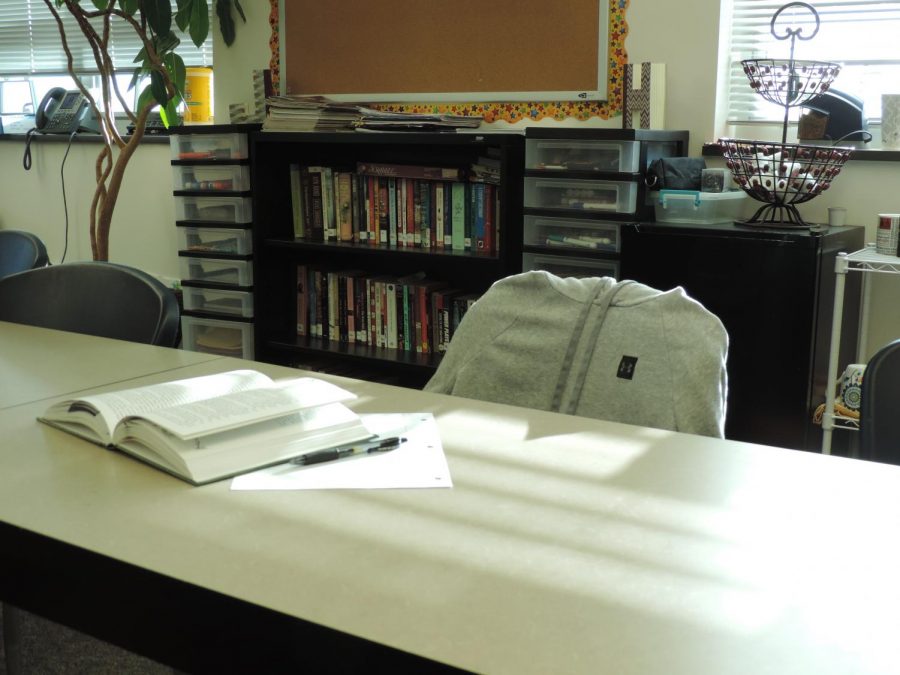Why we all slope into the depths of senioritis and why it is all in your head
Senioritis doesn’t have to slow you down; instead, take it one step at a time
Homework starts to pile up, reading continues being assigned, and deadlines seem to be enclosing you into a tight space.
Tell me if I’m wrong, but right when the bell rings at 2:15, you burst out of here as fast as you can to battle the chaos that is our high school parking lot. You drive home and sit and relax for a couple of minutes, and these few minutes turn into an hour, and the realization that you have homework seems to automatically slip to the back of your mind.
It’s almost as if some physical force is stopping you from ever unzipping your backpack again. And, depending on if you have a job or not, you may work up to eight hours after school, leaving no time for extra motivation or effort to be put into your school work.
This occurs day after day after day, and the longer you push things out, the more anxiety builds up; then the night before a huge test or deadline for a project, you scramble up the resources available to you to make something that is “just good enough.” You can’t make a cucumber from a pickle, and once you’ve fallen into this self-destructive mindset, it is very hard to climb out.
Let’s talk about this phenomenon. The topic that teachers shake their heads at when kids use it as an excuse. Senioritis. What is it really? According to Merriam Webster, it is defined as “an ebbing of motivation and effort by school seniors as evidenced by tardiness, absences, and lower grades.”
Seniors often feel this underlying sense of something blocking them from continuing on, using this new concept to justify their decision of pretty much giving up completely.
In all fairness, I know plenty of people who believe in the opposite view — what exactly is wrong with this phenomenon if we still manage to get our work done just in time? Or what if the accustomed behavior of “just getting by” is part of your daily routine, and you have grown used to it?
I understand this view, but as a high school senior, I’ve found that this view provides little justification. As you slowly evolve into making this an acceptable habit, the less control you have of yourself, and the future you’ve been planning for can take a halt. Consider the following:
Exhibit A: According to the National Association for College Admission Counseling, “22 percent of colleges revoked an admissions offer in 2009”, the most recent year that the group collected data of this sort. Final grades were responsible for the majority of the revocations — “65.3 percent” — followed by “disciplinary information learned about a student and falsified applications.”
Exhibit B: The Education Professionals of the College Board states, “Every year, colleges rescind offers of admission, put students on academic probation, or alter financial aid packages as a result of ‘senioritis.’” The University of Colorado at Boulder rescinded admission for 45 students last year, including 10 who had been through freshman orientation, had selected classes, and had even met their roommates. “It is the hardest time of year because it’s very emotional for families and the students,” says Kevin MacLennan, Colorado’s admissions director.
Life isn’t supposed to be microwaved in 60 seconds; life is supposed to be threaded with beautiful and tasty recipes and different cultural flavors and simmered on low. The more you put things off and do them last minute, the less stable your day will seem and the more you will lose your own self and its foundations. The quicker your day pushes on to be, the more time will go by where you are completely unaware of what you’ve even done. This is where many people experience a “Midlife Crisis”, which typically arises in 40 to 50-year-olds, but many teenagers are facing a similar problem because of this need to keep expanding the “to-do list”. We realize that an allotted time has gone by without actually taking it all in and being present. Mr.Parsons, a teacher here at Mead High School, stated, “I can understand senioritis, teachers feel it too, but it’s also like a little tiny test of our character. Like, are people able to fight through that and not give in to it?”
Motivation is discovered through slowing down, taking things one step at a time, and reminding yourself of the sole reason why you are doing what you’re doing every day. Being adolescents, we need to take the time to not do anything at all and let our minds wander and process the chaotic world around us. We need to ask ourselves important questions like, “Is what I’m doing important to me?” and “Do I truly want to be doing this?”
We need to stop falling into the perception that senioritis is some type of medical condition that makes us unable to move forward and instead shift our behavior to prevention rather than the quick fix. Just like any medical condition, for lasting and long-term results, we must go straight to the root cause of the issue rather than masking it with another prescription drug. Because those pills are just bandaids, just as senioritis is…
High schools today are trying to deal with a substantial motivation risk among students as well as growing rates of depression and anxiety about the future. On my most optimistic days, I wonder whether students’ motivation would improve if more systems were designed to encourage participants to uncover the root of their problem.
Would students be better off if they knew that the difficulty is inevitable rather than something to be labeled and pushed away?
Mrs. Hofmann, a teacher here at Mead High School, responded, “I think kids definitely have senioritis, and sometimes they have it way too soon, but what’s funny is that your life gets so much harder. Now is the time in life where you need to practice focusing when things get harder. Every chapter from here on out will only get more challenging. Senioritis is just an easy way out. You’re entitled to enjoy the moment, but sometimes kids take it too far.”
Students need to appreciate the difficulty of high school and all that comes with it and remember that only the most onerous things will bring us growth within our own self-actualization. Not giving into senioritis is one of the biggest and most important goals that you can aim to achieve. Because the more excuses you make, the deeper you will fall into the pit of self-pity and failure.
And remember, you will always have times in your life where you are faced with opposition, but over time, realize that the only way to truly manage this is to broaden your comfort zone. Nobody has ever achieved anything noteworthy while being safe and snug.
Your donation will support the student journalists of Mead High School. Your contribution will allow us to purchase equipment and cover our annual website hosting costs.

Brenna Cummiskey is a senior here at Mead High School. She loves creating meaningful artwork, volunteering with animals and jamming out to Indie music. Brenna wants her writing to emphasize and spread important messages to benefit the school as a whole.

Ulyana is a junior. She enjoys taking pictures, reading, cycling, playing tennis, and swimming. She hopes to expand and use her creative capabilities in the sphere of photography and discover new ways of writing.
You can contact her at [email protected] or [email protected]











